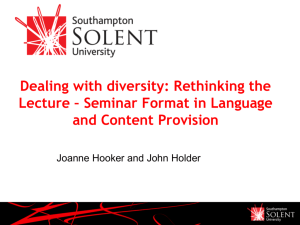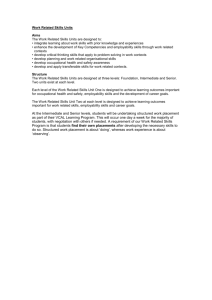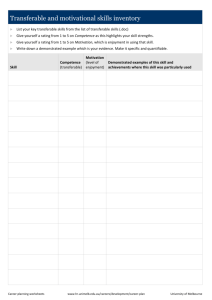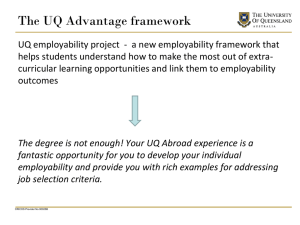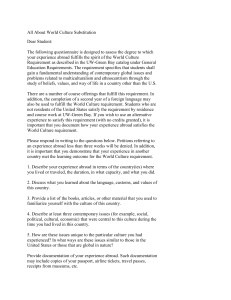leedsdragonsrouteslangs
advertisement
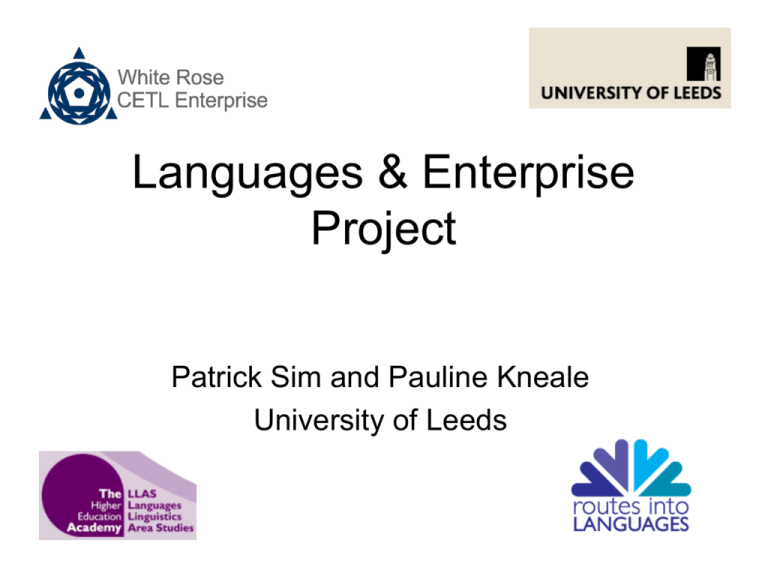
Languages & Enterprise Project Patrick Sim and Pauline Kneale University of Leeds Project Context A research project sponsored by the HEFCE/LLAS ‘Routes into Languages’ initiative. Project Objectives 1. An indicative assessment of enterprise learning provision in HEI language departments 2. Identify and describe instances of enterprise learning practice 3. Consider the barriers and obstacles to enterprise learning provision 4. Look at the synergies between language curricula and enterprise learning Enterprise Learning What do we mean by ‘enterprise learning’? • Emphasis: not on producing entrepreneurs but providing graduates with life & career skills • Link with Employability • Adopt a holistic view of enterprise learning • Seek to ways of leveraging the particular strengths of language degree curricula (e.g. year abroad) Three dimensions of enterprise related learning Deep Learning (Reflection, Self knowledge, Independent learning) Transferable Skills (General and Business specific skills) Business / Enterprise Knowledge (Work based learning, Enterprise exercises & exposure, Business processes) A Scheme for Enterprise Learning Assessment The Association of Graduate Recruiters scheme for graduate Employability identifies four key attributes of graduate employability. Using this scheme has the following advantages; it is holistic, relevant to graduates and provides a link with employability. Employability Specialist Degree attainment Generalist IT skills Creativity Analytical ability Connectedness Ability and aptitudes for working with others (Teamwork, Inter-personal skills etc.) Self Management Reflection Time-management Problem solving Communication Presentations Career management Enterprise Assessment Scheme The assessment of enterprise learning is based on a modified AGR employability template which includes business and enterprise related elements. ENTERPRISE Employability PLUS Degree attainment Degree related and / or core business knowledge Generalist IT skills Creativity Analytical ability Problem solving Communication skills Presentation skills Innovation/IPR Project management Work related communication skills Marketing/Advertising Interviewing Business planning Finance/Accounting Media communication skills Commercial law Connectedness Teamworking Inter-personal skills Negotiation Intercultural aptitudes Self Management Reflection Time management Career management Self Reliance Self directed learning Work based learning Specialist Assessment Cohort Initial research has identified a selection of HEI which involve a range of enterprise learning strategies and methods. • • • • • • • • • • • • Birmingham University University of Central Lancashire Glasgow University Lancaster University Leeds University Leeds Metropolitan University University College London Oxford Brookes University Portsmouth University Salford University Sheffield University Swansea University Translation Cohort: • Bath University • Leeds University • Manchester University Lancaster University German Studies BA Specialist (Option) Level 2, mainly for language assistants, the University of Cumbria accepts students for two weeks teaching training and 4 weeks of paid teaching practice. Skills The year abroad academic project often involves an analysis of the nature of the business (depending on placement type). Connectedness Level 2 Online collaboration exercises with students at Graz University. Self Management Level 1 year abroad preparation involves a week training course, (teaching of English, studying abroad, project work, career development, finances, officialdom, cultural adaptation) Level 2 Portfolio - eight pieces work with reflective summary of progress. Year abroad involves a weekly reflective log and a final summative assessment essay (both in TL) The LU VLE - module information and online tests, ‘MyPlace’ an online environment enabling collaboration and to record personal achievements (e.g. for CV). University of Glasgow Russian BA Specialist Skills Level 2 writing workshop involves CV and job application Connectedness Studying alongside Polish students and visiting students from Europe & US Self Management Weekly learning outcomes plan for in levels 1 & 2 aids independent learning through goal setting Student feedback into teaching approach Year abroad financing and administration is much more problematic than for placements in other countries, and Russia is generally a different and more demanding placement destination. Pre 92 Institutions General Observations Comment Specialist Cognitive emphasis (typically literature Work based and historical study in modern communication languages) Transferable (Generalist) skills Good coverage though typically not assessed Non-cognitive skills often not identified in the program Teamwork Project Management Interpersonal skills Transferable Little, some HEI offer optional business Business (Business) skills related modules communication Connectedness Group work exists though not always assessed Negotiation Meetings Self management Year abroad logs require reflection PDP Student portfolios and formal self Career learning schemes exist on a few courses development Pre 92 SWOT Strengths Weaknesses Depth of content coverage Full year abroad development of self reliance and intercultural abilities Transferable skills under emphasised Limited depth of “working with others” and work based context in learning Opportunities Threats Greater use of business and work Widening range of student ability contexts for language development Modularity Lack of experience of formative assessment/support Mis-perception of ‘dumbing down’ of curriculum Newer Institutions General Observations Specialist Contemporary and vocational slant to curriculum Transferable (Generalist) skills Some examples of assessment of ability Some module titles make clear the skills that are being developed Comment Transferable Generally more prevalent than in Pre 92 (Business) skills HEI Business project Connectedness More emphasis on group activities Negotiated outcomes in learning plans Business related group projects Self management Generally structured portfolio or student learning plans Post ’92 SWOT Strengths Weaknesses Greater emphasis and Shorter period abroad may curtail self reliance visibility of transferable skills and intercultural awareness Career management Skills learning developed through process use or project application rather than by transfer training Opportunities Enterprise basis / context to learning Threats Analysis – (highlights) Specialist language skills • Business and professional skills in the target language exist in most of the core language programmes though in some cases these are only addressed through options. Transferable skills • The languages curriculum teaches a number of skills which can be classed as “for enterprise” rather than content “about enterprise”. Aspects which were represented on all courses include group work, IT use, presentation and all round communication skills. • The majority of courses do not involve interviewing training or experience (either as interviewer or interviewee) • The major problem solving skill developed on language degrees are related to translation • CV production, job application and formal / business letters are valuable skills in target languages though not present in the core language teaching of most the courses. Business skills • A few courses specifically include business related communication (e.g. telephone skills, business register, business letter writing, working relations) in the core teaching. • Some commercial awareness is included in the current affairs and cultural education, though mainly this has to be accessed through optional modules. • Marketing and advertising in the target culture mostly exist in business related options. • Negotiation skills in the target culture were absent from most courses, and not even being available in optional modules. • Learning about enterprise in the target culture is not touched on by any of the courses. Barriers & issues • The Year abroad. This valuable aspect of languages study was often not sufficiently integrated into the overall curriculum. • Modularity. Highly modular programmes did not always give sufficient attention to student progression. • Staff expertise. Especially in small units, the availability of requisite staff expertise was not secure, resulting in significant failures in ability to deliver an adequate range of teaching, or discontinuities in what could be delivered from one year to the next. • Dispersal of staff. Teaching staff were often located in units dominated by a cognate discipline, with risks of marginalisation, or in a number of units contributing to a particular programme, with risks of fragmentation. Barriers & issues (cont) • Specialisation. Staff tending to specialise in narrow areas of their discipline, with potential lack of overview and obstacles to communication between staff from different parts of the disciplinary area. • Assessment. In some cases, the relation between the programme and means of assessment was underdeveloped, and procedures for feedback to students required more attention. • Mixed teaching. Teaching to student groups of different attainment levels, different disciplinary backgrounds, or different personal backgrounds (non-UK, mature, part-time students etc) is widespread, and work was needed to address the difficulties to which this gave rise. • Key skills. These were often advertised, but not always adequately embedded into programmes. In particular, there was sometimes inadequate provision for higher level skills, for example in final year research- or project-type work. • Expert Meeting Next week • End of Project December 2007 Thank you
